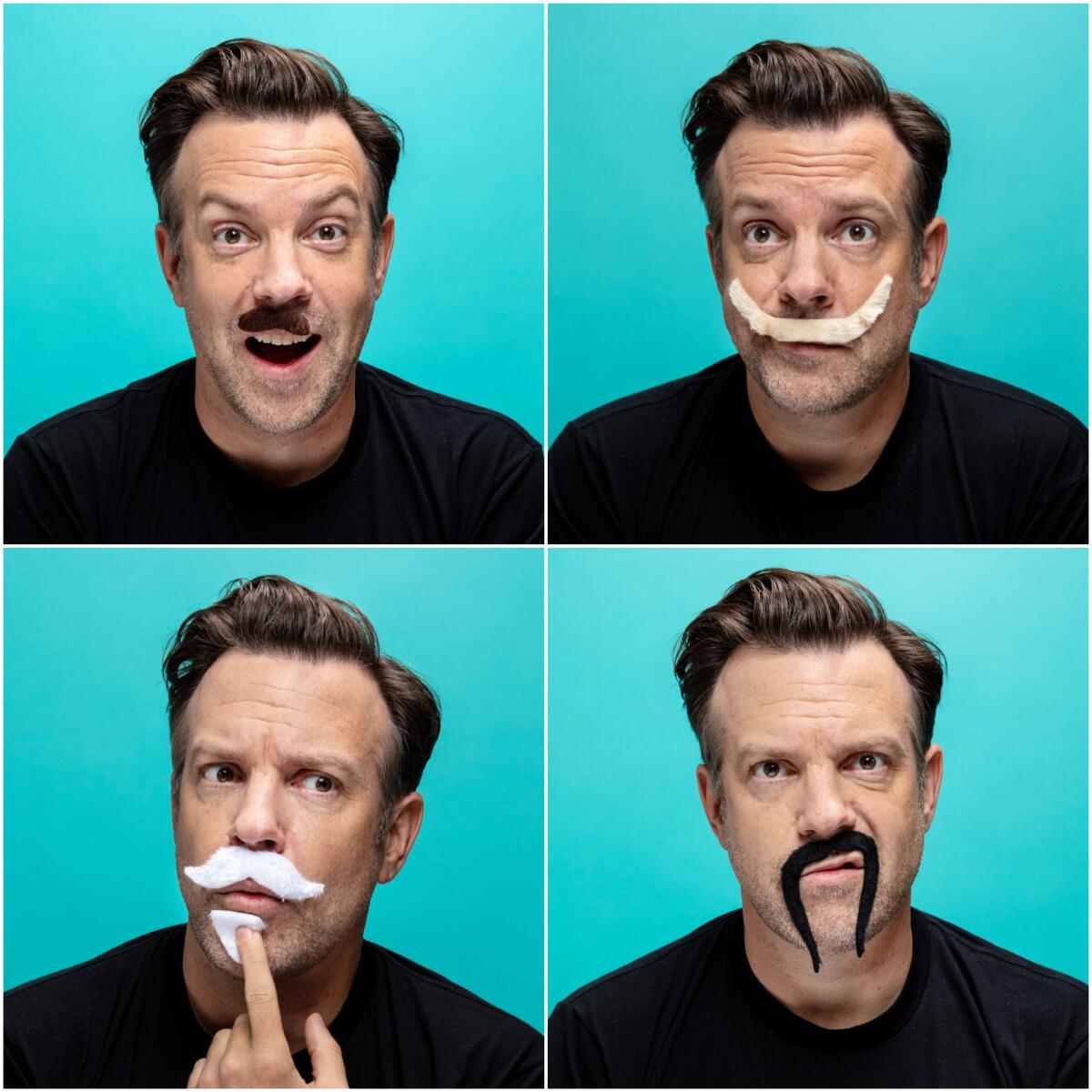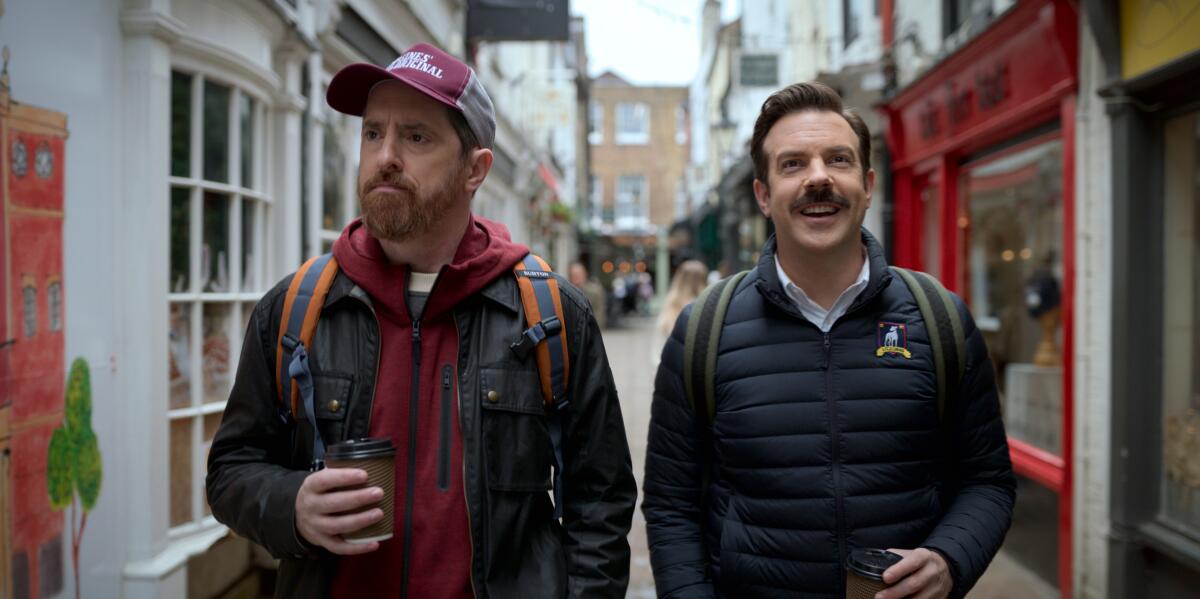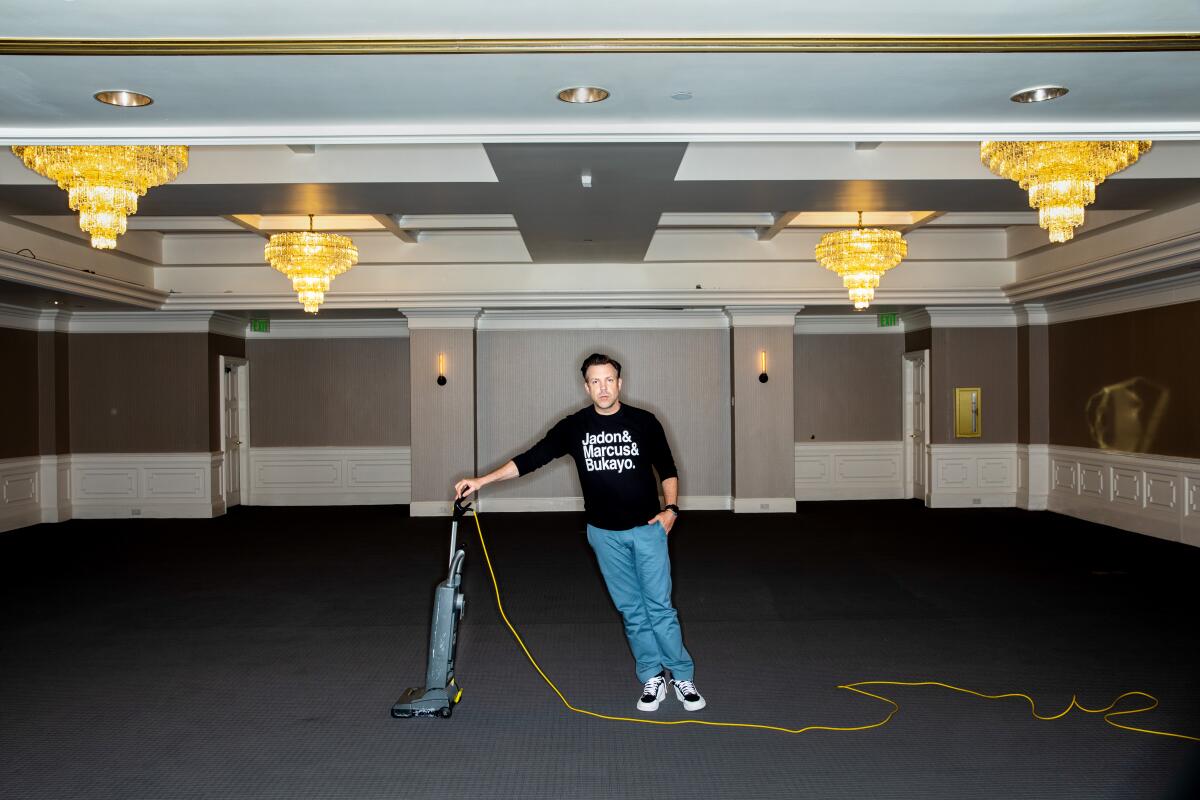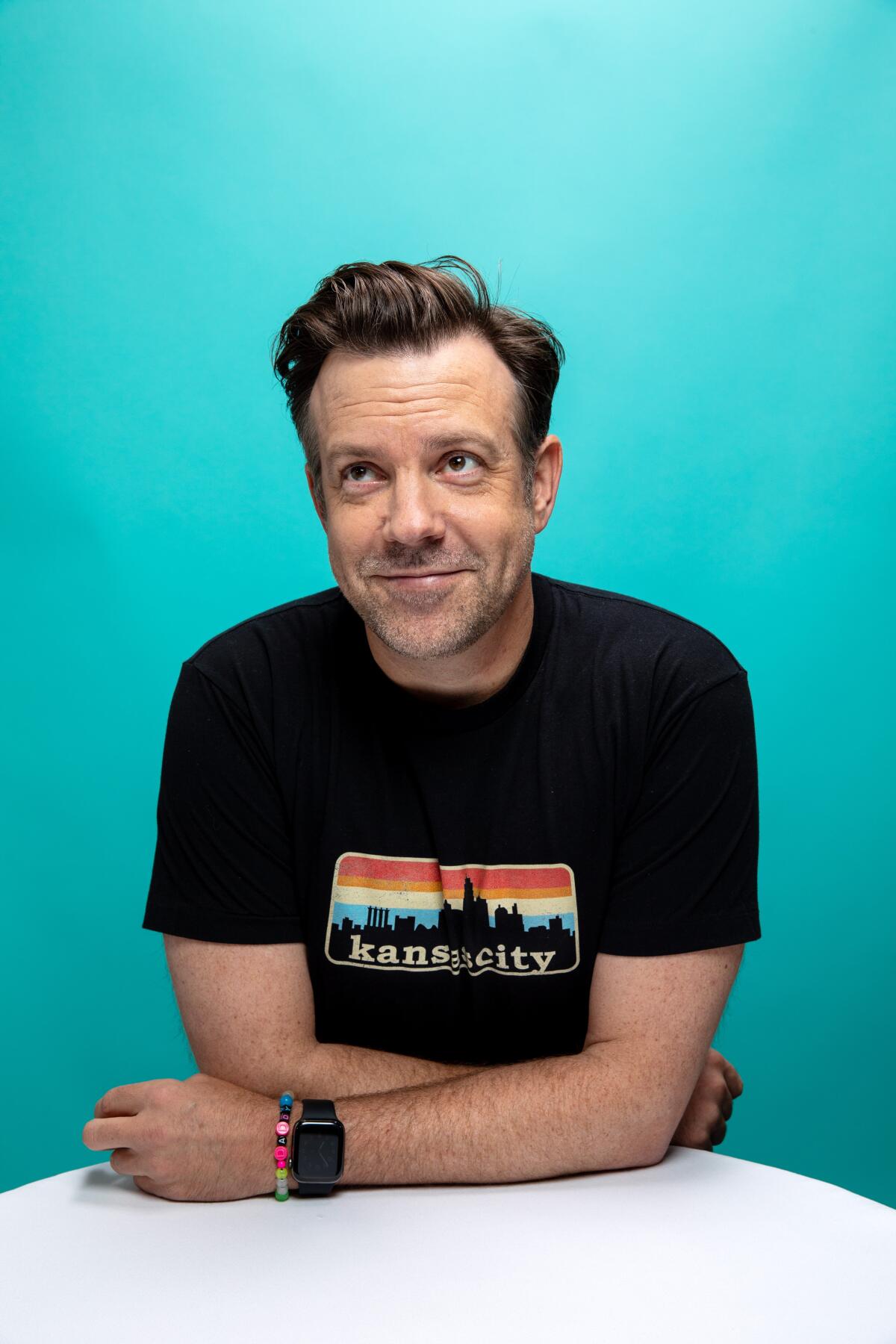Jason Sudeikis embraces teamwork and fights cynicism. ‘I believe in Believe.’

“It’s tough to hug someone when you’ve got your arms crossed.”
This sounds like one of those earnest nuggets of wisdom that Ted Lasso might say, kind of like, oh, I don’t know, “takin’ on a challenge is a lot like ridin’ a horse ... if you’re comfortable while you’re doin’ it, you’re probably doin’ it wrong” or maybe “I believe in hope. I believe in Believe.” Only Ted Lasso hasn’t said this line — yet. Jason Sudeikis, the man who created and plays the folksy, optimistic soccer coach on the hit Apple TV+ series, reserves the right to impart that piece of wisdom at some point in the show’s third season, which he and the show’s writers are beginning to map out now. He has been keeping it in his back pocket, waiting for the perfect moment.
The line came up ... well, how did it come up? A conversation with Sudeikis is a journey full of detours, beginning at say, the healing powers of psychedelic mushrooms and eventually alighting on the many reasons why Eddie Murphy’s Axel Foley is a superhero in “Beverly Hills Cop,” a movie Sudeikis fondly remembers seeing with his father when he was 9. “It forged my sense of right and wrong, good and evil, friendship and the power of wanting to do the right thing for the right reason and sticking to your guns,” Sudeikis says.
But I digress.
We’re talking about hugs, being open to the signs the universe might be sending, fighting cynicism and how “Ted Lasso,” beloved as it may be at this moment in time, wasn’t exactly universally embraced when its first season premiered last August. “The dad pants of sitcoms,” one critic wrote.
“And I imagine if that person could string together 10 of those lines, they’d work as a writer and not as a critic,” Sudeikis says, fixing a smile during a video interview a few weeks ago. Heeeey. Easy on the critic-bashing, I reply. Criticism is its own creative art, and a valuable one. A few minutes later, Sudeikis circles back, saying he appreciated me saying that. “I’m not railing on that line. It is a good line. But I gotta bring my man in the arena, my point guard energy to it too.”
The sports analogy is crucial to understanding Sudeikis and what makes “Ted Lasso” work as a show both on and off camera. Sudeikis started playing basketball in fourth grade, continued through high school and was good enough to earn a scholarship to Fort Scott Community College in Kansas. A community college, yes. But a community college in Kansas, where they take basketball seriously. But he never played, wound up doing a play instead, building on the improv performing he’d done in high school, and the rest is history.

But whether it was team sports or comedy groups, Sudeikis craved company. He could never bring himself to do stand-up. “Too scared,” he says. Succeed or fail, he wanted someone next to him.
“That way, if we get stuck on an island, I can eat them or they can eat me or use me as a floating device or vice versa, you know, for a chance of some sort of survival,” Sudeikis, 45, says, chuckling.
So even though “Ted Lasso” is named after the gentle, pun-loving coach Sudeikis plays, it’s very much a team effort, more so as the show has established its characters — the English players Lasso leads, the assistants who keep him honest and the team owner, Rebecca (Hannah Waddingham) who hires this know-nothing American to spite her soccer-loving ex-husband and then comes around to his generous spirit, particularly after forging a friendship with Keeley (Juno Temple) ... and ... and ... well, it’s a deep bench. The second season, currently airing, gives the entire cast even more opportunities to shine.
“It’s a company of players,” says Waddingham, one of seven cast members to earn an Emmy nomination. (The show itself picked up 20 nods, a record for a first-year comedy.) “No one thinks they’re more important than anyone else. People could easily think we’re being cheesy, but the fact is we really bloody dig each other. And it has to be honest. Otherwise everyone would smell a rat.”

Waddingham isn’t joking. And, yes, people could easily think that the love fest among the show’s ensemble and creative team is too good to be true, that the vibe (everyone talks about the “Ted Lasso” vibe) of optimism that courses through the series can’t possibly exist in a business famous for displays of ego and selfishness.
Sudeikis counters, saying arrogance is absent from the intent of the show, the creation of the show, the realization of the show. Talking about “Ted Lasso” feels weird to him, wrong even. He uses a PG-rated form of a crude term for self-pleasuring to describe his resistance to talking about himself because it is not in harmony with what “Ted Lasso” is about.
“Jason has done a lot of good stuff,” says longtime friend Brendan Hunt, who co-created “Ted Lasso” and plays an assistant coach on the show, “and this is probably the best thing he’s done.” Hunt mentions Sudeikis’ work on “Saturday Night Live,” the “Horrible Bosses” movies, “We’re the Millers” and more, noting that if, in fact, “Ted Lasso” is the apex of his career (it is), it is probably because it is “the most from his heart and full of his DNA.”
“So he’s offering more,” Hunt says. “He’s always had this much to offer. He just hasn’t been afforded the chance to do so, at least not in this fashion.”
Sudeikis will cop to that, saying that he feels proud of the show, that he aimed at a target, hit it and that process is the “culmination of a lot of people’s hard work and effort and giving a damn.” But don’t ask him about the show’s popularity, the reasons behind it or if it has changed his life, because he can’t (won’t) speak to the show’s reception (“that’s nothing I have any control over”) and, as for his life, what life? The last couple of years — and the year ahead — have been devoted to writing, filming and editing “Ted Lasso.” (“No rest for the wicked,” Hunt puts it.)

That February night you saw Sudeikis wearing the hoodie, delivering a rambling acceptance speech at the virtual Golden Globes? That’s his vibe right now. Three o’clock in the morning, not high (“I was not smoking pot,” he says, laughing at the widely held assumption that he was stoned) and fully embracing every tangential thought that enters his mind. (Don Cheadle, a friend and fellow nominee, jokingly gestured for Sudeikis to wrap up his speech. Waddingham tells me she simply fixes him with a stare when he strays off the verbal path. She demonstrates, and it’s as terrifying as you might think.)
“You want to love the art in yourself, not yourself in the art,” Sudeikis says, repeating a quote from the revered Russian actor and teacher Konstantin Stanislavski. “That speaks to me toward how ego can get in the way and how power can corrupt, especially in this business.” That’s why he loves team sports, he adds, because “that would be beaten out of you.”
“Ensemble art is all I’ve ever really gravitated toward, because you’re competing against yourself and you’re competing with things that are in you — ego, apathy and cynicism,” Sudeikis continues, riffing on the “vibe” of “Ted Lasso.” “Know that you as an individual can beat those three away and then with like-minded people filled with an intentional desire, you can destroy them, you can obliterate them.”
More to Read
From the Oscars to the Emmys.
Get the Envelope newsletter for exclusive awards season coverage, behind-the-scenes stories from the Envelope podcast and columnist Glenn Whipp’s must-read analysis.
You may occasionally receive promotional content from the Los Angeles Times.











